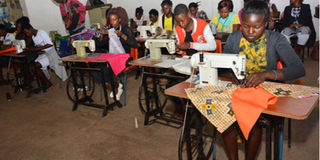Prime
Focus on vocational skills to promote job creation

What you need to know:
- Uganda as a country has taken large strides towards development since the colonial period and needs expertise now more in the vocational sector than in public service because we are aiming to move towards industrialisation.
‘Branch off’ is the term commonly used to mean that someone joined a vocational institute after acquiring PLE, UCE or UACE certificates. There is a lot of stigma that has been created around the aspect in that the mere mention of it sounds to many Ugandans like failure to attain good grades, failure to raise school fees; and quite often the person in question is thought to be headed for a bleak future but what could have been the source of these ruinous stereotypes?
Uganda’s education system was developed largely by the voluntary acts of organisations, especially those of Christian missionaries. Good education facilities at the time were available only to a small elite group, and oriented towards white-collar jobs, while the masses remained largely illiterate. The system produced mainly clerical and administrative personnel required by the religious institutions and the colonial administration.
The Business, Technical Vocational Education and Training (BTVET) system as we know it today (it was called the Technical and Vocational Skills Developement (TVSD) back then), was a very small sub-sector and it was designed to produce manual workers who were predominantly drawn from the underprivileged and uneducated sections of society. People hardly want to identify with the group that is considered underprivileged, so that was the beginning of the stigmatisation of BTVET in the country. That is a misconception that has endured to date, and that needs to be corrected.
Uganda as a country has taken large strides towards development since the colonial period and needs expertise now more in the vocational sector than in public service because we are aiming to move towards industrialisation. More than 60 years after independence, it is absurd that we are still basing our perspective on a system that was established to create workers for colonial administrators.
Considering the direction that the economy is taking, it is imperative that we change the status quo.
Currently, the economy needs vocational skills a lot more than it needs university degrees, masters or PhD. The true ratio of jobs in our economy is 1:2:7 for master’s degree to university degree to one-year certificate or two-year diploma respectively.
That means that, for every occupation that requires a master’s degree or more, two professional jobs require a university degree, and seven jobs require a one-year certificate or two-year diploma; and each of these technicians are in very high-skilled areas that are in great demand. This ratio is a fundamental to all industries. It was the same in 1950, the same in 1990, and will be the same in 2030. Wouldn’t you agree that we have been focusing our energy on the wrong figures of the ratio?
I highly commend the President for not only emphasising the faculty of science but also putting in place the Zonal Presidential Skilling Hubs. These, along with Emyooga programme that is aimed at giving youth vocational skills to start up business are going to be paramount in industrialising the economy.
Our part as Ugandans in this is to start considering these programmes not as those meant for the ‘disadvantaged youth’, but rather as meant for all Ugandan youth who are passionate about acquiring hands-on industrial skills. If you come to think of it, there is nothing embarrassing about baking a good cake, sewing a good dress or making good furniture.
These are admirable skills that are highly sustainable, with the ability to create jobs. Getting a qualification in any of these and specialising in them is as good as acquiring a degree in journalism or law, and one might even argue that they are better.
There are other areas that I think would help a great deal in pushing this agenda forward. We all know the famous government scholarships at the university level; these have been especially very helpful in widening the reach for university education to so many youth who would not have afforded it otherwise.
If these scholarships can be directed to vocational institutes too with the same energy and equal or better incentives, we could have a big chance at pushing the stigma around vocational studies into oblivion. Aside from the fact that incentives have the ability to push campaigns very fast, young people would feel more comfortable following a programme that is so supported by the government.
We also need to introduce to students at an early level to the fact that it is okay to focus on learning skills like carpentry, welding, plumbing, tailoring and making them life skills. Because if we are being honest with ourselves, a university degree does not guarantee a bright future anymore, but a skill does.
Edson Rugumayo, Youth MP for Western Uganda.




